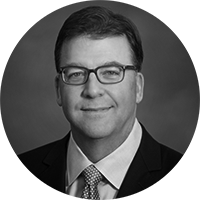
World-Renowned Ophthalmologist to Lead Clinical Development of
Advanced Therapies to Treat Ocular Diseases
June 29, 2021 – Seattle, Boston and Tokyo – Edward Holland, MD, has been named medical advisory board chair of Aurion Biotech, whose mission is to cure blindness by developing a differentiated platform of advanced therapies to treat ocular diseases. Dr. Holland will work closely with the Aurion Biotech executive team in advancing its lead candidate, cell therapy for the treatment of corneal endothelial disease, and in helping to expand the company’s platform of advanced therapies.
“Dr. Holland has been an innovator in corneal surgery for his entire career, which is why he recognized very early on that corneal endothelial cell therapy is a game-changer. He has been one of Aurion Biotech’s strongest supporters and we are honored that he’ll deepen his engagement with us,” said Greg Kunst, chief executive officer of Aurion Biotech. “It’s nearly impossible to communicate the breadth, depth and impact of his prolific career. From his ground-breaking innovations in endothelial keratoplasty and limbal stem cell therapy, to the volume and quality of his publications, to his teaching and mentoring of ophthalmology residents, fellows and colleagues, Dr. Holland’s productivity and accomplishments are astonishing. We are gratified and excited that he will help drive innovation at Aurion Biotech.”
The company’s first candidate is a cell therapy for the treatment of corneal endothelial dysfunction, invented by leading ophthalmic surgeon and research scientist Professor Shigeru Kinoshita and his distinguished colleagues at Kyoto Prefecture University of Medicine (KPUM) in Japan.
“I’m at a fortunate stage in my career, where I can focus my time and efforts on the projects that matter most to me,” said Dr. Holland. “The team at Aurion Biotech is deeply talented, and I’m delighted to continue the incredible work of Professor Kinoshita and his colleagues at KPUM, for the benefit of millions of patients who suffer from corneal endothelial disease.”
In addition to his position at Aurion Biotech, Dr. Holland serves as the director of cornea services at Cincinnati Eye Institute (CEI) and professor of ophthalmology at the University of Cincinnati. Dr. Holland has a national and international reputation for his knowledge and expertise in the field of medical and surgical corneal problems and for limbal stem cell transplantation. His team at CEI/University of Cincinnati has the largest ocular surface transplant program in the world. His clinical interests include corneal transplantation, corneal endothelial cell therapy, ocular surface transplantation, ocular trauma and cataract surgery.
Dr. Holland received his medical degree from the Loyola-Stritch School of Medicine in Chicago and completed his residency in ophthalmology at the University of Minnesota. He pursued fellowships in cornea and external disease at the University of Iowa, and in ocular immunology at the National Eye Institute (National Institutes of Health). He returned to serve as director of cornea and refractive surgery service at the University of Minnesota, was promoted to the position of professor, and was granted the Elias Potter Lyon Chair in ophthalmology. He also served as president of the Minnesota Academy of Ophthalmology.
Dr. Holland was the co-principal investigator of the Cornea Donor Study, the largest clinical trial ever conducted in the field of cornea. He has published extensively in both basic and clinical research and is the author of over 250 articles in peer-review journals. He has co-edited five editions of Cornea, the most widely read textbook on corneal disease and surgery.
Dr. Holland has received numerous national and international awards, including: the Asian Cornea Foundation Medal of Honor; the Castroviejo Award from the Cornea Society; the Honor Award, Senior Achievement Award and Life Achievement Honor Award from the American Academy of Ophthalmology; the Binkhorst Medal from the American Society of Cataract and Refractive Surgery; and the Paton Society Award from the Eye Bank Association of America.
Dr. Holland formerly served as president of the American Society of Cataract and Refractive Surgery (ASCRS) from 2011-2012. He was also a member of its Executive Committee and now serves as its program chair. Dr. Holland was a former member of the Board of Trustees for the American Academy of Ophthalmology. He has also served on numerous committees and as secretariat of the Annual Meeting for the American Academy of Ophthalmology. Dr. Holland has served as chair of the Eye Bank Association and was the former chair of its Medical Advisory Board, as well as a longtime member of its Board of Directors. He is the past president of the Cornea Society and previously served many years on its Board of Directors.
About Aurion Biotech
Based in Seattle, Boston and Tokyo, Aurion Biotech is a clinical stage biotech company. Our mission is to cure leading forms of blindness and transform the lives of millions of patients, by developing a platform of advanced therapies to treat ocular diseases. Our first candidate is for the treatment of corneal endothelial disease, and one of the first clinically validated cell therapies for corneal care. Healthy cells from a donor cornea are cultured in a novel, multi-step, proprietary and patented process. Cells from a single donor can be used to treat more than 100 recipient eyes. In early research and Phase 2 & Phase 3 clinical trials in Japan, patients have experienced significant and durable improvements in key measures of corneal health: visual acuity, corneal endothelial cell density and corneal thickness. The Aurion Biotech team is preparing for clinical trials in the U.S. To learn more about Aurion Biotech, a division of CorneaGen Inc., visit www.aurionbiotech.com
Media Contacts:
|
Judith McGarry 415-971-2900 |
Michele Gray 917-449-9250 |
 On Pragmatism, Collaboration, Hard Work and The Merits of Large Families
On Pragmatism, Collaboration, Hard Work and The Merits of Large Families
When it comes to predicting success in life, birth order and family size are hotly-debated topics. Popular psychology asserts that middle children are more neglected (therefore more disadvantaged and less likely to succeed) than their oldest or youngest siblings.
Dr. Edward Holland is a striking contradiction to that assertion.
“My parents had five boys in six years. I was number three, so I learned to go along to get along,” he says. He believes his large family (nine siblings in total) also fostered his independent thinking, curiosity, and relentless work ethic. Everyone in Holland’s family worked very hard, starting with his mother, an ob-gyn nurse at the local hospital. Her example set the tone at home. “Growing up in a big family leaves you little room for self-delusion,” he says. Self-awareness and innate pragmatism helped him become a capable negotiator: he learned to avoid conflicts by watching his older brothers clash with their parents.
It also filled Holland with a yearning for greater purpose. He knew he wanted to make a difference with his life but didn’t choose medicine until late in college. Ophthalmology became his focus only after exposure midway through medical school. “I knew I wasn’t the smartest student, but I knew how to organize a problem by eliminating 90% of the noise, and then focus on the 10% that really matters. My brain just works that way.”
That clarity of focus means he has been astonishingly productive with his time (and achievements). A self-described good-but-not-brilliant med student, Holland decided to conduct ophthalmology research to enhance his credentials. It resulted in a presentation at ARVO and a publication in Investigative Ophthalmology & Visual Science as a medical student. This academic work paved the way into an ophthalmology residency at the University of Minnesota. There, Holland trained with world-renowned ophthalmologist Dr. Richard Lindstrom, who is legendary for finding and encouraging talent. Lindstrom urged Holland to pursue a corneal fellowship at the University of Iowa and a second fellowship in immunology at the National Eye Institute. Lindstrom saw the value of this training and invited Holland back to Minnesota to establish one of the first high-risk cornea transplant services.
But Holland’s path wasn’t always smooth and simple. In Minnesota, he struggled with a subset of high-risk corneal transplant patients who had limbal stem cell failure, a diagnosis not well understood at the time. Ocular surface transplants were being performed but rejection was a major problem. Systemic immunosuppression (as was applied to organ transplant patients) was required to prevent rejection of ocular surface transplants, but those immunosuppression protocols weren’t being used. Dr. Lindstrom urged Holland to seek out the University of Minnesota’s head of renal transplants, Dr. Jon Najarian, to see what lessons could be applied to ophthalmology.
“Najarian was a former football player, and a titan in his field of medicine, so he was an intimidating guy!” exclaims Holland. “His feedback to me was, ‘either you step up and join the big leagues or move out altogether.’ Najarian felt that either we should fully, truly adopt immunosuppression, or not use these meds at all.”
Holland took Najarian’s advice and transformed the ophthalmology team’s success rate. This experience also encouraged Holland to follow his curiosity and passion – increasingly in the areas of corneal transplants, ocular surface transplants (and more recently, corneal endothelial cell therapy and limbal stem cell therapy).
Holland realized he’d found his purpose in life: “I felt like I truly had a calling to solve cornea blindness cases that my colleagues couldn’t solve.”
After many successful years in Minnesota, Holland pursued an opportunity to build a bigger cornea service in Cincinnati. Once again, his relentless work ethic, pragmatism and ability to work effectively with others were essential to establishing what he calls the “four-fecta” of successful collaboration between the University of Cincinnati, the Cincinnati Eye Institute, St. Elizabeth’s Hospital (in next-door northern Kentucky) and Cincinnati Children’s Hospital Medical Center.
While academic / community relations in medicine are typically thorny, it’s the exact opposite in this region. The four organizations share knowledge, resources, fellows and credit for their successes. During his tenure, Holland and his colleagues have made Cincinnati a global destination for treating the most complex, high-risk ocular surface diseases in patients of all ages. Referrals come from all over the US and abroad.
Holland cites great teamwork – at the individual and institutional levels – for this success, but certainly it all starts with his leadership style: direct, no-nonsense, collaborative and curious. Holland disagrees: success is due to the “four institutions’ shared commitment to excellent patient care.”
What brought Holland to Aurion Biotech? Holland chuckles. “As with most of my life-changing career decisions, I can blame Dick Lindstrom!” Lindstrom sought out Holland to join the Medical Advisory Board for CorneaGen, when it was founded in 2015. When CorneaGen in-licensed ground-breaking corneal endothelial cell therapy from Professor Kinoshita and Kyoto Prefecture University of Medicine, and then established Aurion Biotech to further develop this cell therapy, Holland decided to deepen his involvement. “I love the Aurion Biotech team: they’re smart, curious and collaborative. No egos,” Holland says. “Corneal endothelial cell therapy is truly transformative; I’m really enjoying this work!”
The feelings are mutual. We at Aurion Biotech are grateful for, and inspired by, Dr. Holland’s leadership.